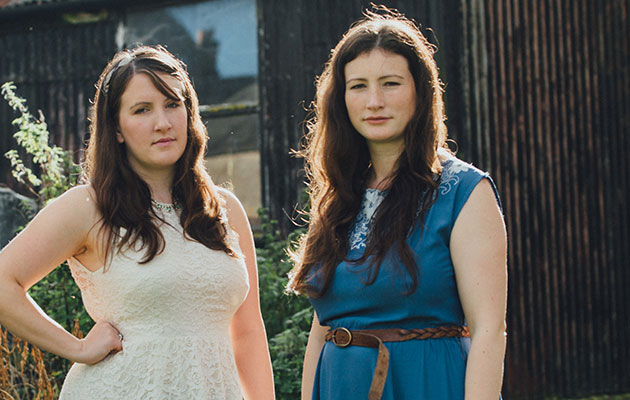If you came for the clog dancing, prepare to be disappointed. The opening track on the fifth album proper by Rachel and Becky Unthank sets an uncompromising pace. Billowing up on clouds of strings and trumpet, “Mount The Air” meanders through the ten-minute barrier, the sisters’ vocal mantra – a fragment gleaned from a book of Dorset ballads – transforming it into a Catherine Cookson approximation of Gavin Bryars’ hobo rhapsody “Jesus Blood Never Failed Me Yet”. It is emblematic of an album which has a substantial undertow of progressive rock, a fair amount of jazz, and a smear of West End greasepaint, with the sinuous vocals that made the Unthanks the Watersons of the iPhone generation.
Those who have tracked the Northumberland sisters’ career closely may have seen this coming. The transition from Rachel Unthank and the Winterset to the Unthanks – effected in 2009, when Rachel Unthank’s husband Adrian McNally and his childhood friend Chris Price joined the band – changed their musical DNA. 2009’s Here’s The Tender Coming and 2011’s Last picked at the boundaries of folk music with an intensifying urgency. The extraordinary rendition of King Crimson’s Starless on Last was a milestone of sorts; the Unthanks’ more recent album of Robert Wyatt and Anthony and the Johnsons covers another.
Pieced together in the Unthanks’ newly-built studio, in a disused farm building down the road from McNally and Rachel Unthank’s family home, Mount The Air is an earnest push for something bigger. Over an hour long, it might be more McNally’s album than anyone’s; a Yorkshireman raised on King Crimson and Miles Davis, he is the primary writer and arranger, with his defence of progressive rock to Uncut a fair assessment of this quest for new ways to tell old stories. “By definition, if you are going to make progressive music, you are going to get it wrong half the time,” he explains. “And if you don’t, you’re not trying hard enough.”
The 11-minute set piece, “Foundling”, which dominates Price and McNally’s oddball east-west instrumental closer, “Waiting”, is another inconclusive experiment, as is the hand-cranked trip-hop of “Flutter”, but violinist Niopha Keegan at least finds a new slant on folk music’s fusion of the ephemeral and the eternal with “Dad’s Song”, which splices a recording of a 1978 studio chat with her musician father to an intense instrumental lament. It’s a rare stab of unfettered emotion on a record which is – vocally at least – a model of restraint.
The Unthanks’ readings of “Madam” and “The Poor Stranger” are elegantly clipped, while Rachel Unthank injects the wildly melodramatic “Died For Love” with a wonderfully weary froideur, the protagonist’s wish to be “a maid again” transformed from the lament of a wronged lover to the wistful thoughts of a mother of young children in dire need of a good night’s sleep.
And maybe that’s what Mount The Air needed most of all. It is a record seemingly following a 3.00AM quest for meaning when the Unthanks’ cold-light-of-day instincts tend to lead them to more interesting places. Evidence: the harmonium-bathed “Magpie“, the sisters whipping up a brilliantly eerie harmony arrangement around a chorus of “Devil, Devil, I defy thee,” the atmosphere so evocative that you can almost hear the sound of twig brooms scratching on church steps.
The rest of Mount The Air is tentative by comparison; stylish, and extremely skillful, but a bit too much arr and not enough trad.
Q&A
RACHEL UNTHANK
Mount The Air is another move away from pure folk music.
Obviously that core harmony sound is still the foundation of who we are, but we’re interested in all kinds of music, and the music is always the way to help tell the story. Me and Becky love working with Adrian cause he can take us on musical journeys that we could never have imagined. It’s important not to limit yourself.
Has parenthood much of a mark on this record?
Obviously it is very much in our consciousness, but when you’re looking for women’s songs in the folk vernacular, inevitably a lot of songs about womanhood are about children as well. Having the children really helps me recording. I used to get nervous and anxious, but now I will say ‘I’ve got an hour, I’ll do some singing’, and then go home again’. It helps me not to be precious and to just get on with it.
Has having a new studio made much of a difference?
It is like literally down the lane. When we were recording, I would wheel my youngest son Arthur down and he would fall asleep on the way and then I would sing my song and then I’d wheel him back up again. It’s a godsend having the studio close but not in the house. There used to be wires down the stairs – the cupboard under the stairs was the vocal booth. We used to record at all hours and once you have children you can’t do that.



